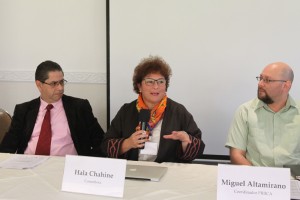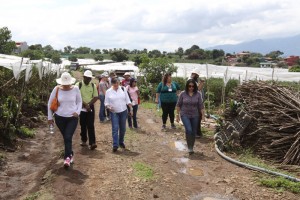By Dr. Hala Chahine-Tsouvalakis, Director, The Postharvest Education Foundation

Miguel Ángel Arvelo (IICA’s Representative in Costa Rica), Hala Chahine (The Postharvest Education Foundation), and Miguel Altamirano (PRIICA coordinator), during the opening of the workshop. / credit: IICA
This post is part of the ADM Institute’s #PreventPHL blog campaign, following up on the First International Congress on Postharvest Loss Prevention. To read more posts in the series, click here.
The Postharvest Education Foundation was invited to develop a workshop for the Inter-American Institute for Cooperation on Agriculture (IICA) to raise awareness on postharvest losses and the means to reduce food losses. Twenty-two senior technical personnel and specialists, and members of the Local Consortia for Agricultural Technology Innovation and Research (CLIITAs) of the Regional Program for Research and Innovation in Agricultural Value Chains (PRIICA) were trained in Costa Rica on the use and application of the Commodity Systems Assessment Methodology (CSAM) for problem identification and solution finding. CSAM is a systematic method for identifying and measuring the factors that lead to postharvest losses, and detecting problems related to the quality and quantity losses of a produce in a specific location.
The workshop was held in early November 2015, and the participants developed skills that they can now share with national stakeholders to apply the methodology in 12 countries in Central America, South America and the Caribbean region. The participants also learned how to write project proposals in view of improving the efficiency of agricultural value chains while reducing food losses.
The event was organized by IICA through its projects – (1) Competitiveness and Sustainability of Agricultural Chains for Food Security and Economic Development (“Agricultural Chains”) and (2) Productivity and Sustainability of Family Agriculture for Food Security and the Rural Economy (“Family Agriculture”) as part of their planned activities for 2015.

A group of participants of the IICA CSAM workshop during the tomato farm field visit. / credit: IICA
The workshop included a field visit to a tomato farm in Heredia, Costa Rica, where participants observed different stages of tomato harvesting and packing.
IICA expressed their commitment to apply the methodology and obtain concrete regional data about postharvest losses as well as possible options for improving the situation. This is especially important given that their beneficiaries seem to be losing more than 20-30 percent of their production at the farm gate. Participants in the PHL Congress will be familiar with these kinds of postharvest problems, and may also find the Commodity Systems Assessment Methodology which was first developed by Jerry La Gra in 1990, useful for assessing losses for many different crops, and for identifying potential solutions in their own countries.
The blog entries in this #PreventPHL series are by students and members of the PHL Prevention community of practice. The opinions expressed are those of the individual authors and do not necessarily reflect the position of the ADM Institute. In addition, none of the statements should be considered an endorsement of any person, product, or technique by the ADM Institute.


No comments yet.